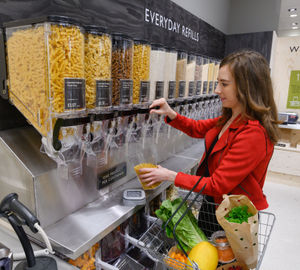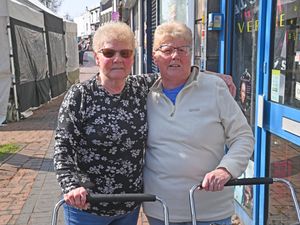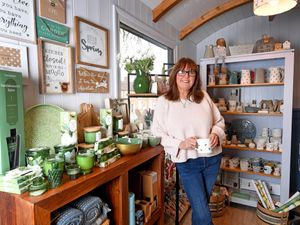Shoppers send their packaging packing
A supermarket's trial of packaging-free retail could indicate that people are ready for a return to more traditional, basket-on-the-arm shopping.

It wasn’t all that long ago that most high streets had a butcher, a baker, and a candlestick maker.
Okay, maybe not a candlestick maker.
But shopping was something that could be done on one street, with a basket over your arm.
Those days are gone. Supermarkets which have everything under one roof, all pre-wrapped for your convenience, and with acres of parking just outside the front door have become the norm.
But as anybody who has seen the old Hovis advertisement will tell you, nostalgia is powerfully addictive – and now the traditional shopping method may be about to come back.
Just this week the Hovis ‘Boy on the Bike’ advert, directed by Ridley Scott, returned to screens almost 50 years after it first aired.
And Waitrose also hopes to target the revival of the packaging-free shopping in an effort to be more green.
It is trialling a system in which customers will be able to fill up their own containers with products ranging from pasta and wine to washing up liquid, in a system that would look more at home at Blists Hill Victorian Town than the 21st century’ family shopping trip.
Customers will be able to “borrow a box” from the shop then return it on their next visit.
Waitrose says the ideas have the potential to save on thousands of tons of unnecessary plastic and packaging, and it will be available on 160 loose fruit and vegetable products, frozen mango, strawberries, blueberries, cherries, pineapple and raspberries available as pick and mix, wine and beer available on tap for bottling, as well as coffee, pasta, rice, grains, couscous, lentils, cereals, dried fruit and seeds.
While it is still in a supermarket environment, there are similarities to traditional high street shopping.
The question is, will it ever catch on in wider terms and will customers buy into this method of shopping?
Tor Harris, from Waitrose & Partners, said: “This test has huge potential to shape how people might shop with us in the future so it will be fascinating to see which concepts our customers have an appetite for.”
Ian Evans runs the Broad Bean Delicatessen in Ludlow with his wife Alice.
As a business they say they are committed to sustainable shopping. All their loose weigh packaging is plastic-free, with the exception of deli pots which are currently long-term re-usable, recyclable plastic.
“Things like our cheese sales are massively up because of the way we package,” he said.
“They’re are not in plastic wrap. It’s the worst thing you can do for it as it goes sweaty and wet.
“One thing we have struggled to do is engage and encourage customers to bring their own packaging, tubs and Tupperware. You can’t be reliant on that.”
Ian says that Broad Bean invested heavily some time ago in compostable and re-usable packaging and says that now it’s something which is catching the public, conscious supermarkets are having a “knee jerk” reaction to it.
“We have product knowledge, and that is quite labour intensive,” said Ian. “We have the ability to talk to people about what they are cooking, what they are looking for, any alternatives and things they may prefer or that we think could work better. That is quite traditional. People think what we do here is a bit olde worlde, but it has clearly worked.”
While Ian believes shopping locally is the best and most green way to shop, he is sceptical that there would be any return to the traditional way of shopping.
“I’m not sure you’d see a return to the traditional high street as it was,” he says. “Supermarkets will always exist. But what we find is that people are happy to shop at the supermarket, but will come here if they’re looking for something different or particular.”
Still the Waitrose move has gone down well with environmental groups.
Ariana Densham, ocean plastics campaigner for Greenpeace UK, said: “Lots of supermarkets are starting to sell loose fruit and vegetables, which is good, but more importantly this kind of innovation could spark a refill culture that’s so desperately needed to cut plastics in mainstream shops.
“The top 10 UK supermarkets produce 810,000 tons of throwaway packaging each year, so we need to see other major retailers taking plastic reduction seriously.”





